- Home
- Ellen Datlow
Mad Hatters and March Hares Page 2
Mad Hatters and March Hares Read online
Page 2
“A RIDDLE?” The avalanche sounds curious.
“I am here and there, neither and both, impossible and present. I come and go as I please, and nobody can pin me down. What am I?”
“LOSER!”
“Wrong!” the not-Alice-nor-Josh cries. “Give up?”
“NO! I GET THREE GUESSES!”
A sigh. “Okay. Go for it. What’s guess number two?”
A pause as the giant gives the question some thought. “A CATERPILLAR!”
“Wrong!” The voice is triumphant.
“NOT FAIR!” The giant roars. “THERE’S NOTHING LIKE THAT IN THE WORLD! YOU’RE A DIRTY LYING CHEAT!”
“Third guess!” crows the not-Alice-nor-Josh triumphantly. “And it’s wrong!”
The foothills shuffle, the leg towers tremble. I hold my breath; Horse lifts her nose out of the patch of clover she is cropping. Not-Alice-nor-Josh is holding the vorpal fire-iron and looking a little pale.
“Me! That’s the answer: Me! I’m Me!”
Three times, as any fool can tell you, is magic, even in a backwards place like Looking-Glass Land.
The sun comes out, the warm wind stills, the foothills and leg towers (and, presumably, the giant above them) have disappeared, leaving simply rocks and trees, with observable tops. Me is swelling with pride, beamish, solidly and uniquely Me-like. “Wow,” they say. “That was pretty cool, huh?”
“A glorious victory,” I agree, and sigh. “And now I must leave you. You’ve only a few yards to go. Down that hill and over that brook, and then you’ll be a Queen.”
“I’m good,” Me says gently. “Thank you anyway. You want to sing your song now?”
“No,” I say firmly. “I do not. But if you will wave to me until I reach that turn in the road, I would be grateful.”
Me nods. “You got it. Um. Thank you. For everything.”
“Don’t mention it.”
With Me’s help, I drag Horse away from the clover, mount, and head back along the road. The sky is blue, the air is sweet, the trees cast dancing shadows upon the path. Horse stops short. I cling to the saddle and the bundle of reeds; I do not fall off—then, or when Horse starts up again.
When I am nearly to the turn, I pull on the reins until Horse stops, I suspect from sheer astonishment.
Me is standing by the brook. They are dressed in a blue overall and big, black boots, and waving a scarlet bandana.
I stand in my stirrups. “Me,” I shout, “is not a real name, you know.”
Me grins like a Cheshire Cat. “I know. It’s my own invention.”
LILY-WHITE & THE THIEF OF LESSER NIGHT
C. S. E. Cooney
“And ‘the wabe’ is the grass-plot round a sun-dial, I suppose?” said Alice, surprised at her own ingenuity.
“Of course it is. It’s called ‘wabe,’ you know, because it goes a long way before it, and a long way behind it.”
—Lewis Carroll, Through the Looking-Glass
“Four buzzards in a storm-belted sky—and someone,” Mother said, “has been stealing caterpillar silk again.”
Mother did not look at Lily-White when she said it, but Lily-White bridled at the implied reprimand.
She had not kipped a single thread of that ever-sticking silk since she was thorn-high to a vorpal rose—and that had been a unique situation. A dangerous venture, denuding a caterpillar of silks. Not only is the Borogovian Caterpillar a gregarious species, she is also gargantuan, a colossus of nature. The last thing anyone wants, especially when that anyone was not a very tall anyone at all, is for an entire sibling society of large larval lepidopterons to aggressively pursue one home.
The “four buzzards” part meant nothing, Lily-White decided. That was just Mother being dramatic. When you were Hetch of the Borogoves, you spoke in riddles from underneath ominously lowered eyebrows, even to—especially to!—your own daughters.
Ruby-Red looked up from polishing her sword. “Which silks were taken, Mimsy?”
“All,” Mother replied. “Tents and trellises ripped from their moorings, hunting webs cut down—prey included—and the nursery emptied of cocoons. The caterpillars themselves…” She shook her head. “Pierced through. Chewed. Spinners hacked off—those taken, too. Naught much left but blue guts and fuzz.”
Lily-White, whom nothing much bothered when it actually happened, remembered waking up that morning awash in forefeeling. (The Edible Dictionary of Wabish Verbs once defined the infinitive “to forefeel” as “Suffering the emotions of a traumatic event before it occurs without divining any actionable knowledge about it.” The last copy was eaten four hundred years ago.) She had cried and cried, her body wracked with shock, then nausea, succeeded at last by sadness. Now she knew why.
“All?” she asked. “All dead, Mimsy?”
While Lily-White did not like caterpillars (it is difficult to feel affection for creatures who try to gobble you up just for stealing the least skein of silk, and that for an urgent cause), they had spun their parasitical palaces back behind Mother’s cottage ever since she could remember. And now they were gone.
“Vidi nihil permanere sub sole,” Mother said severely, quoting this year’s Motto. I have seen that nothing under the sun endures. Her shoulders and neck were bull-heavy, perpetually sunburnt, freckled with an exact map of the Looking-Glass constellation (whatever it happened to be on a given night). Her thick arms bore the dagger-deep scars of her vorpal roses, which she had bred and raised to her peril. Just, she often observed, as she had her own daughters.
Ruby-Red wiped a tear away. Unlike her sister, she always cried at the right time.
“There, there.” Mother patted her eldest daughter’s head. “One did survive after all. Baby-Blue, the newborn. Found him in a basking basket high up in the trees. Sound asleep, sunning himself through the slaughter. ’Twas his snoring alerted me to the rescue. Brought him home. Be in a delicate state till I can procure him some poppy seeds. Cast ’em out back on the shady side of the cottage. Coax ’em to bloom, milk the pods, dry the gum. Then we’ll see if Baby-Blue will latch.” She sighed. “Little ones don’t always latch, you know—if it’s not their own mother’s hookah. Like I said, delicate. So don’t go messing with him, either of you.”
She squinted at her daughters through the smoke-black lens of her hexacle, which she wore to protect loved ones from her Evil Eye. Whenever that hexacle came off, swinging from its chain like a bruised pendulum, the girls knew they were in trouble.
“Wasn’t you, was it, Lily-White?” Mother asked abruptly. “Did you do those caterpillars in and burgle their silk?”
Lily-White stomped her foot. “I only took that one skein, Mimsy! One time! I was practically a baby back then! And I never killed anybody!”
“But you’ve a hardness, girl. Meticulous and methodical as the shadow of Mount Gnomon.”
Lily-White bit her lip. That was true.
“And you, Ruby-Red? Innocent or guilty?”
Ruby-Red grinned. Her teeth glittered like garnets, as they did when she was angry. “Wasn’t I, Mimsy. I’m no thief. Besides”—she tossed her lava-colored hair—“I like to chop things up, not chew ’em. You know that.”
Mother knew that. Every so often, she would wake to find all her roses decollated, their petals decorating her parlor so prettily she couldn’t even scold. She smiled at her daughters.
“Well, then,” she said. “I’m content as ever I was before my tragic walk this morning. And now you girls have a new brother!”
Blowing them a Hetch kiss, which fluttered from her lips in the form of a black moth to brush a benediction upon their brows, Mother swarmed up the loft to check on the cradle. Her cooing voice floated down, mingling with the peeps and mewls and chitters of Baby-Blue.
What hath teeth but hath no mouth
That ne’er shall swear nor be foresworn?
Nor eyes nor ears nor nose hath she
But champs and chaws thee, grates and grinds thee
Gnaws thy flesh to tatt
ers torn?
Lily-White stood a while, rubbing the kiss-pollen off her forehead and pondering Mother’s song. She wondered if it had to do with their next Motto. About time for a new one.
One of Mother’s duties was to maintain the Motto of the Wabe. The Motto spanned the southernmost part of the Dial where the shadow of Mount Gnomon never touched. Each spring, Mother cut a new Motto out of the tender green grass with a push mower. She filled in the stubble with luminous pebbles so that the words could be read plainly by very high-up things, like giant blond girls and insect swarms and the migratory borogoves who flew down from the north every summer and roosted in tall, teetering columns of themselves just south of the Motto until winter came. The caterpillars always captured a few columns each year, and spun their palaces about them, sucking each bird dry of substance and leaving only stiffened, silk-draped skeletons, which rose in ghostly groves behind the Hetch’s cottage.
Mother’s song faded.
Lily-White turned to Ruby-Red, who hummed an off-key echo of the lullaby as she polished her sword.
The sword was a thing of beauty, forged of silk and thorn. Could slice a diamond like butter. Lily-White’s work, years of it. She owed Ruby-Red her life from early on in her infancy, but when she made a gift of the sword, both sisters acknowledged the debt had gone down some. Perhaps she owed only a quarter of her life now. Or someone else’s life, should Ruby-Red require it and Lily-White had the means to deliver.
Lily-White plopped down on the sofa next to her sister, who stopped humming.
“The last time Mimsy grew poppies,” Ruby-Red reflected, without looking up from the gleam on her lap, “we had all those wonderful dreams!”
“We also got constipated,” Lily-White grumped.
“Well, we know better now,” Ruby-Red said. “Drink it, don’t smoke it, and never three days in a row.”
“Still—a brother?”
And such a brother! Lily-White thought, grimacing. Caterpillars really were insufferable.
Ruby-Red shrugged. “He can keep Mimsy company whilst we go off on adventures!”
“We never have adventures.”
“We will, Egg-White,” Ruby-Red assured her sister, who wrinkled her nose at the abhorred nickname. “I’ll make sure of it—if I have to conjure one up myself! There are wonders amassing wonders out there in the wide green Wabe, and we must quest us a few!”
Suspicious, Lily-White tried again to catch her sister’s eye. Had Ruby-Red, after all, slaughtered those caterpillars simply out of boredom? It was not in keeping with her character; she was very fond of animals—even horrible, hairy, opium-smoking bugs. And even if she had, Lily-White reasoned, Ruby-Red would have boasted about it, not lied to Mother.
Besides, what would she need all that silk for? Her sister was no crafter. One had to be very patient and careful to work with Borogovian Caterpillar silk, for it binds whatever it touches, and holds forever. Didn’t Lily-White know? The amount of Jubjub oil it took to scrape that stuff off her fingers, after!
She opened her mouth to pester for more information—but then the roses started singing.
When a vorpal rose sang, it meant she was happy.
Which meant somebody was bleeding.
* * *
This is Lily-White’s earliest memory of the vorpal roses.
She is not yet two. She often cries for no reason. Later, when reason occurs (her four-year-old sister dropping her on her head, for instance, or Mother forgetting to feed her in a timely manner due to some distraction, like a stranger visiting, bartering for boons of their local Hetch, as they often did and still do to this day—this very day in fact, which will bring us back to the vorpal roses of the present, but not yet), later, when any other child would be whining and whimpering and writhing, Lily-White is as calm as winter in Wonderland.
At first Mother is inclined to think her second daughter fussy and spoilt (which she is), but one day she comes to the cradle, and without warning, Lily-White awakens from her nap, opens her mouth, and lets out a scream.
It is a very particular scream. It is the scream of a tiny child, not yet two, who has been snatched bodily from her little bed, thrown out the window, only to break her fall in the tangle of vituperative vorpal roses waiting below.
It is unmistakably the single most awful sound a mother’s ears will ever suffer, and it is instantly recognizable.
Of course, there is only one thing to do—and the Hetch of the Borogoves knows just what it is.
She snatches Lily-White from her bed and throws her out the window.
What follows is nothing. Not a shriek, not a whimper. Not what you’d expect from a baby presently swaddled in barbs.
Mother wonders if Lily-White has died in the fall. She asks her eldest (and now possibly only) daughter to check the thorns, just in case. Ruby-Red, her milk teeth turning the color of blood in her fury, dashes headlong into the briary snarl, hollering and cursing and hissing as the roses start to giggle, singing and slicing in retort. A vorpal rose loves when a child bleeds; young blood is beauty’s finest fertilizer. At last, Ruby-Red seizes her bewildered baby sister out of the grasp of those terrible raking thorns, and bears her back to safety.
The sisters will bear the scars from this adventure their entire lives. A life that Lily-White now owes mostly to her sister, minus the price of a magic blade.
The blade, of course, is the reason she stole the caterpillar silk in the first place. When she is old enough to creep, Lily-White crawls deep into the grove of borogove skeletons, where the caterpillars live. She steals a skein of nursery silk, whereupon eight outraged aunties give chase. But they are doped with opium; the splendor and delicacy of their highly dressed hookah instruments slow them down. Lily-White escapes exsanguination in a hunting web by the sag of her nappies.
Shortly thereafter, when she gets steadier at walking, Lily-White teaches herself to walk backward. She devotes herself to circling the cottage, over and over, backward and widdershins, as fast as she can go. Everything moves sunwise on the Dial, so moving widdershins at speed has the “tweedling” effect, which you may have heard about, as Lily-White did, in that old song:
“You’ll whistle up the sun, my lad
I’ll thistle down the leaves
You’ll wheedle up the stars, my lad
I’ll tweedle down a breeze
And with my leaves, you’ll see, my lad
I’ll blot the face of day
And with my breeze, your stars, my lad
I’ll blow them all away.”
And so, Lily-White tweedles up such a wind around the Hetch’s cottage that the vorpal roses rattle together. Shiver and shake and shudder together. Squeal and scrape and wail together.
Of course, nothing can slice off the thorn of a vorpal rose but the thorn of another vorpal rose. Thus are roses quite standoffish, and only nod at each other from a distance, gravely and vainly and very much on their dignity, out of sheer self-preservation.
But in that wind that Lily-White whips up, every thorn of every vorpal rose catches every other thorn of every other vorpal rose, and cuts them all to the quick. Fang-sharp thorns the flashing green of certain sunsets fall like hailstones, bleeding sap onto the cobbled path that labyrinths its way through the briary snarl.
That’s when Lily-White leaps out of her tweedledance.
She scrambles on her knees and gathers up the thorns in a net woven of caterpillar silk. Later, she rolls this silken net and the thorns inside it flat with Mother’s rolling pin (which she has dipped liberally in Jubjub oil, to prevent sticking). She heats the length of this spiky mess on Mother’s forge, and pounds it into shape with Mother’s hammer, and cools it in a pail of Mother’s special Wishing Well water. (As careful as she is, she leaves silk everywhere, and especially on herself. Weeks of washing in that vile Jubjub stuff for her.)
“Voilá!” she cries to Ruby-Red when at last she is done. “A vorpal sword, and all for thee!”
“It’s a frumious weapon t
hat can hack the heads off anything!” Ruby-Red exclaims in glee. “Worth at least three-quarters of a life of a stupid baby sister!”
This satisfies Lily-White. Even at the fierce age of four, she hates being in debt.
But she never stands between Mother and a window again.
And she never likes caterpillars.
And though she makes a truce with the roses—who eventually grow back their thorns—they all agree to loathe each other mutually and cordially, and make this sacred vow: the roses will withhold their scratches and jeers from the youngest Hetchdaughter of the Borogoves. Said Hetchdaughter will, in turn, employ her scurrilous winds only for other, less genteel foes.
Which brings us, ten years later, back to the vorpal roses of the present.
* * *
The thorns had caught two cheshires, although Lily-White only saw one at first, the other being mostly invisible.
The Cheshire Bear was not invisible, though in bad shape. Once a dapper and debonair bear, with sequin-speckled waistcoat, daintily glittering tutu, and tricorne with a cockade of peonies affixed to the front, now he was shaggy, grayed-out, matted, the yellow of his great eyes suggesting jaundice rather than pots of honey. He gasped for breath, and the vorpal roses had taken no small pleasure in raking his fine clothing to ribbons.
“Oh, how he groans!” cried the Baronne Henriette de Snoy with glee. She was pale pink and carmine, vigorous with petals, and she smelled divine. “Oh, how he moans for his mama bear!”
“A bear should show more dignity!” chortled General Jacqueminot, preening like a butterfly upon her glossy foliage.
A cluster of Jeanne d’Arcs shrilled, “Get him off! Get him off! He’s bleeding all over our hips!”
Ruby-Red, who loved animals and hated roses, charged out of the cottage behind Lily-White, blade raised. When the shadow of the vorpal sword fell upon Lady Banks, Lady Hillingdon, and the Lady of Shalott, they squeaked and emitted a strong musk of perfumed terror. Distress furled their yellow and apricot petals to tight buds, which they tried to hide beneath their leaves.

 Inferno
Inferno The Best of the Best Horror of the Year
The Best of the Best Horror of the Year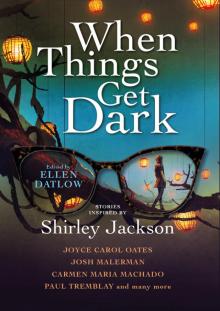 When Things Get Dark
When Things Get Dark A Whisper of Blood
A Whisper of Blood Echoes
Echoes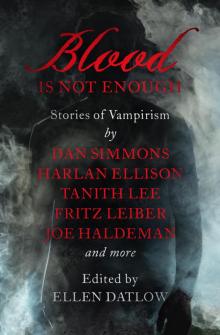 Blood Is Not Enough
Blood Is Not Enough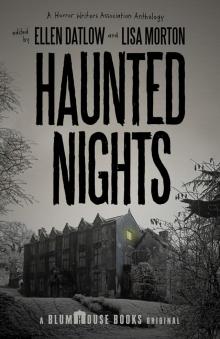 Haunted Nights
Haunted Nights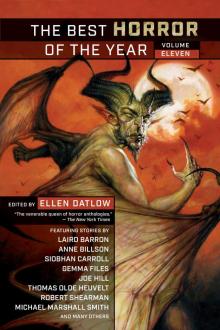 The Best Horror of the Year Volume Eleven
The Best Horror of the Year Volume Eleven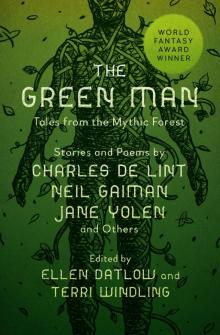 The Green Man
The Green Man The Dark
The Dark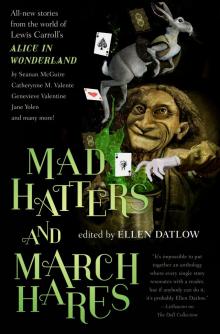 Mad Hatters and March Hares
Mad Hatters and March Hares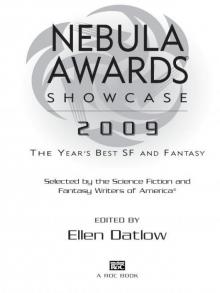 Nebula Awards Showcase 2009
Nebula Awards Showcase 2009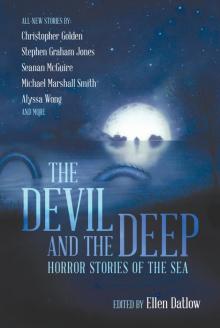 The Devil and the Deep
The Devil and the Deep